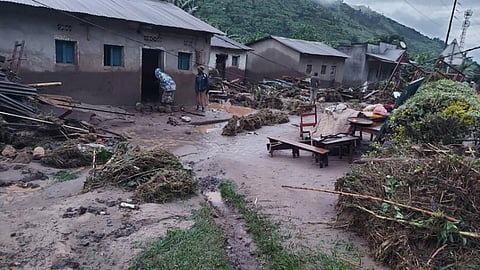

Disastrous floods and landslides on May 2 in the African countries of Rwanda and Uganda have taken the lives of at least 136 people, according to official reports. The torrential rain that triggered the devastation was triggered by climate change, according to an expert.
Around 130 deaths have been reported so far in Rwanda and over 5,000 homes were destroyed in the country’s northern, eastern and southern provinces by torrential rains, according to the authorities.
Many people were asleep when the rains started pounding, reverend Father Longin Niyonsenga of Butete Parish told this reporter. “Excessive rainwater started entering people’s homes. Some tried to escape, but many drowned in their sleep. Landslides also destroyed many houses near the mountains,” he said.
Rubavu, Ngororero, Nyabihu, Rutsiro, Karongi, Gakenke, Burera, Musanze and Nyamagabe districts were the most affected.
In neighbouring Uganda, at least six people have been confirmed dead. The death toll may rise as more rain is expected over the next two months, warned weather authority Rwanda Meteorology Agency.
Rwanda President Paul Kagame May 3 said he was monitoring the situation and offered condolences to the bereaved families through Twitter.
Rwanda has known floods in the past, but recent deluges have been particularly damaging. In 2020, the country lost 80 people to floods and landslides.
People dig through rubble to look for survivors. Photo: Ngala Killian Chimtom
Experts have linked the current deluge to a warming climate. According to the Intergovernmental Panel on Climate Change, the globe is on track to breach the 1.5 degrees Celsius warming threshold by 2030, and for every 1°C of warming, extreme precipitation may intensify by seven per cent.
“What’s happening in Rwanda and Uganda is a direct consequence of a warming climate,” Richard Munang, deputy regional director of the United Nations Environment Programme (UNEP) Africa Office, said.
“Already, the globe has warmed to 1.1°C and Africa is warming up at twice the global average. East Africa has seen temperature increases of up to 1.7°C. This means the consequences of a warming globe, which includes extreme events such as precipitation, will continue to escalate,” Munang told this reporter.
The floods worsened due to plastic bags clogging the waterways, he added.
“Rwanda might have stringent laws against plastics, but it’s not the same case in the rest of East Africa where single-use plastic bags account for up to 12 per cent of waste. Floating plastic is a significant risk factor that reduces the efficiency of drainage systems causing flooding,” Munang said.
He also blamed suboptimal planning resulting in encroachment into natural drainage areas such as swamps and wetlands surrounding cities.
“Building on flood plains and other riparian areas is a significant risk factor. It reduces the efficiency with which flood waters can be drained to these natural drains, swamps and wetlands within cities that are part of the critical green infrastructure needed to control flooding,” Munang said.
The UNEP deputy regional director underscored the need to strengthen early warning systems to ensure more people at risk can access and be forewarned before the onset of disasters and guided to move to safer areas.
“Using ordinary mobile phones as means to channel information to citizens will go a long way to enhance accessibility,” he said.
Secondly, the climate action narrative needs to be taken from a socioeconomic lens wherein people must be able to move to safer areas.
“This is possible by prioritising inclusive investments in areas that can unlock enterprise and income opportunities for the majority. As an example, investing in simple solar dryers is a mitigation action to process and preserve agri-produce can increase income by up to 30 times. Such strategic thrust should be part of approaches used to build resilience to climate emergencies,” he said.
Thirdly, Munang advocated investing in “green infrastructure solutions like conserving and restoring ecosystems like wetlands, swamps, etc, so they can adequately drain flood waters.”
Fourth, he called for upscaling the fight against pollution, “especially plastic litter, to ensure it does not end up blocking drainage systems.”
While floods are afflicting Rwanda and Uganda, several parts of East Africa are suffering from an opposite climate change-triggered disaster: Drought. “Rainwater harvesting needs to become an urgent policy priority to deal with this,” Munang recommended.
He also suggested fostering the cross-hybridisation of indigenous knowledge across the continent. “Across Africa, techniques such as digging zai pits have been applied to harvest rainwater while ensuring storage for lean seasons,” the UNEP deputy regional director said.